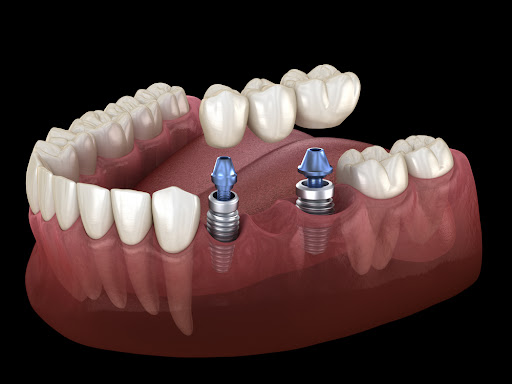Are you tired of hiding your smile due to missing or damaged teeth? Dental implants at Philadelphia Oral & Maxillofacial Surgery may be the life-changing solution you’ve been searching for. In this comprehensive guide, Philadelphia oral surgeon, Dr. Cyndi Nguyen explains the ins and outs of dental implants, the types available, the surgical process, post-implant care, and answers some frequently asked questions. Get ready to embark on a journey towards a more confident and beautiful smile!

Dental implants are a revolutionary tooth replacement option that involves surgically implanting metal posts into the jawbone and subsequently attaching artificial teeth.
A dental implant consists of three distinct components, each playing a vital role in the overall structure and function of the implant.
Dental implants offer a multitude of advantages, ensuring not only an improved smile but also enhanced oral health and overall well-being. Here's a more detailed look at the benefits:
A single-tooth implant is a dental procedure wherein a dental implant and a crown are utilized to substitute a single missing tooth. The dental implant replaces both the lost natural tooth and its root, making it function like your own teeth. The procedure for dental implant placement entails placing a titanium post into the jawbone to serve as a substitute for the absent tooth root. Subsequently, a crown is positioned atop the post to act as a replacement for the missing tooth.
An implant-supported bridge is a dental restoration that replaces multiple missing teeth and is affixed permanently to dental implants. This type of bridge is fixed and supported by titanium screws placed into the jawbone for each missing tooth, rather than relying on adjacent teeth for support. Implant-supported bridges offer a more secure and comfortable alternative to traditional bridges, as they are affixed to dental implants that are implanted in the jawbone.

Zygomatic implants are a specialized option for patients with inadequate upper jawbones for traditional implants. These implants are placed in the zygomatic bone, which is located in the cheekbone region. They are utilized to provide support for a full arch of teeth when there is insufficient bone in the jaw for standard implants, serving as a replacement tooth option.
In some cases, zygomatic implants may be recommended in conjunction with sinus augmentation, a surgical procedure to elevate the sinus floor and promote increased bone development for successful implantation. Studies have demonstrated that zygomatic implants are effective in addressing atrophic edentulous maxilla and maxillectomy defects.
This advanced dental implant solution provides an alternative option for those who may not be eligible for traditional dental implants due to insufficient jawbone structure.
Full-mouth dental implants are a comprehensive solution for those seeking to replace multiple missing teeth. Dental implants are the foundation of this treatment, offering a permanent and natural-looking alternative to traditional dentures or partials.
Full mouth dental implants involve strategically placed titanium posts which serve as artificial roots for the missing teeth. Once these posts are securely in place, a series of custom-made full-arch restorations are attached to the implants, effectively replacing the entire upper or lower set of teeth.
The initial phase of your dental implant journey is consultation and evaluation, where your oral health, bone density, and overall eligibility for dental implants are assessed. This stage is vital for determining the best course of action for your specific needs and ensuring the long-term success of your dental implants.
The consultation and evaluation process typically involves:
Your Philadelphia oral surgeon will assess your suitability for dental implants based on your oral health and medical history, as well as any other relevant factors. She’ll also review your options for sedation dentistry if you’re nervous or in for a long procedure.

After you’ve been declared an appropriate candidate for dental implants, the next stage is the surgical procedure. This includes placing the implant post into the jawbone, as well as attaching the abutment and artificial tooth.
During the surgical procedure, your oral surgeon will make an incision in the gum to access the underlying bone and then drill holes into the bone to place the dental implant metal post. In certain cases, the abutment is secured to the post during the implantation process.
Post-surgery, your body will initiate a process known as osseointegration. This involves the jawbone growing around the implant post, creating a strong foundation for the artificial tooth. Osseointegration is essential for the long-term success of dental implants, as it ensures a secure and stable base for your new teeth.
The healing period for osseointegration varies and can take several months, depending on factors such as the specific implant used and your individual healing process. During this time, it’s important to follow your dental professional’s guidance on proper oral hygiene and postoperative care to ensure a successful outcome. With patience and diligence, you’ll soon be able to enjoy the full benefits of your dental implants.
Upholding optimal oral hygiene is vital to stave off infection and secure the longevity of your dental implants. Proper oral hygiene habits, such as regular brushing and flossing, can help clear away plaque and bacteria around the implant, thereby helping to avert infection and inflammation.
In addition to regular brushing and flossing, it’s also recommended to use antibacterial rinses and interdental brushes to clean the implant area and remove plaque buildup. Moreover, regular professional cleanings are essential to maintain the health of the soft tissues around the implant and preserve the strength of the jawbone. By prioritizing oral hygiene, you can ensure the lasting success of your dental implants.
Routine dental check-ups are instrumental in monitoring the health and state of your dental implants. During these check-ups, your Philadelphia oral surgeon can evaluate your implants and adjacent tissue, take X-rays, and assess for any signs of infection or damage.
It’s generally recommended that patients with dental implants schedule check-ups every six months or as advised by their Philadelphia oral surgeon. By staying vigilant with your dental check-ups, you can help ensure the long-term success of your dental implants and maintain a healthy, radiant smile.
Along with maintaining proper oral hygiene and attending dental check-ups, it's essential to be mindful of your diet during the initial healing phase. After dental implant surgery, you should stick to a soft diet and avoid hard, crunchy, or extremely hot/cold foods for a certain period. Your Philadelphia oral surgeon will provide guidance on dietary restrictions during the recovery period to promote optimal healing.
To ensure the long-term success of your dental implants, it's crucial to avoid habits that can damage them. This includes refraining from chewing on ice, using your teeth as tools (e.g., opening packages), and habits like smoking, which can increase the risk of complications and implant failure. It's essential to be aware of these potential risks and make necessary lifestyle changes.

Dental implants offer a life-changing solution for those seeking to restore their smile and improve their overall oral health. Learn how you can enjoy the long-lasting benefits of dental implants and regain the confidence to smile brightly once again. Call Philadelphia Oral & Maxillofacial Surgery by dialing 215-273-3223 or by submitting our online contact form. We serve new and returning patients from Philadelphia and surrounding areas such as Springfield, Kensington, and Levittown, PA.